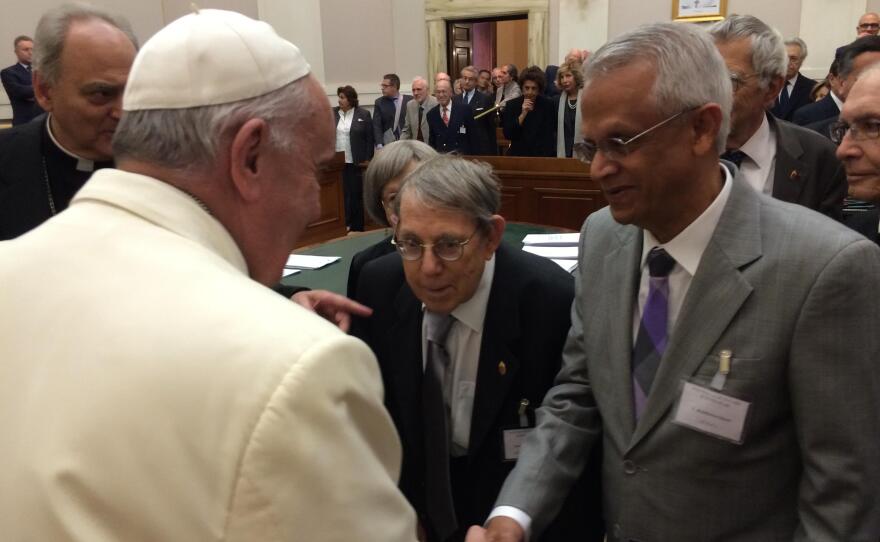This is KPBS midday edition. I'm Maureen Cavanaugh. By executive order earlier this week President Trump rolled back a major part of resident Obama's environmental legacy. The order directs the EPA to begin dismantling the clean power plan which would have phased out the reliance on coal in favor of new wind and solar farms. Obama's clean power plant was helping to get -- joining me to discuss the implication of this rollback is an 11. Also member of the -- professor welcome, Hello. I'm pleased to join you. Like to get your reaction to the president's move to dismantle the clean power plant. This is devastating. First by switching from: renewable -- renewable we would reduce the smog by 20%. That alone would have prevented 140,000 asthma attacks in children. Saved 2500 to 6500 premature deaths from the air pollution. Second on the climate change, coal is the most polluting since -- for climate warming. As a scientist it's disheartening and saddened by this step backwards. Even though this executive order seeks to reestablish coal as a dominant industry aren't there market sources making that likely. I'm glad you asked. The devastating part is a setback on the morality of the community. What impact if any will it have, I personally am not that concerned about our back on clean caol plan. Coal Has not become that effective. Solar is cheaper. Solar is within 10 to 15% of coal. the second statistics I want to give you is that US greenhouse admissions have come down by as much as 10% in the last seven years. You ask yourself how is that possible by the simple fact that gas is cheaper. Gas puts 40% CO2 for the same PowerGen as coal. The market will correct for this. I doubt this will have a huge impact on our clean house gas emissions. Could President Trump move and bold other nations like China for instance to slow down its own strategies to curb emissions that were laid out in the Pierce climate change? That is the real worry what is the signal that will send to the rest of the world particularly someone like China. That train has already left. China is going rigorously on solar and renewables. At the same time it's cost for worry. The president said during the campaign he would cancel the Pierce climate change agreement. He would withdraw from it. Do you expect that to be carried out? You expect that U.S. to withdraw from that agreement? It is very difficult for me to make political predictions. U.S. would have a huge negative impact. I have participated in this negotiation. I have a feeling it's not going to cancel the entire agreement. I think many nations their commitments are strong and they have seen their economy improve. I don't know -- Sweden has cut its emissions by 30% and the jobs and that Jeep -- GP grew. I don't think it will change. The commitment will continue. You said you feel uncomfortable making predictions in the political arena. Considering how crucial these climate goals are, DC the scientific community in the U.S. getting more political -- may be taking a stand of this dismantling? What is truly sad about this is that some of the most important parts of climate change including collecting the data were done by top institutions in the U.S. I personally know scientist from 20 different states worked on this. By going back we are going back on America science. How are scientists going to respond to this? I cannot comment for all the scientists but I will tell you in my own example scientists in California are charged because other governments -- our governor, Mayor they have reaffirmed their commitment in California is a living laboratory. We will create a big boost to the economy. The load will be carried by many states. I hope California with other states to join them. When scientists hopefully will not get political. This issue -- climate change has become political. It has a issue. Climate is an issue dealing with humanity particularly -- I worry about all the people in the U.S. living in the rural areas. I don't know how they will deal with the storms, droughts and heat waves. All of those are expected to get worse. Not 100 years from now but 10 or 20 years from now. It's people suffering. I personally would not support scientist because then the people do not have anyone to go to for real information. At the same time, I personally am talking to people through religious institutions. I go to churches. I talk to people there because we need in a political forum to discuss this. I must tell you -- I have spoken to over 10 churches. Many in San Diego. The feedback I get back from them is very positive. Scientist have to find a way to talk about this to people directly in the nonpolitical manner. I've been speaking with Professor. Veerabhadran"Ram" Ramanthan . He's at Scripps institution of oceanography at UC San Diego. Thank you very much professor. Thank you Maureen.
This week, President Trump signed an executive order aimed at rolling back part of former President Obama's environmental legacy.
The order directs the Environmental Protection Agency to begin to dismantle the Clean Power Plan, which would have phased out the nation's reliance on coal in favor of new wind and solar farms.
Obama's Clean Power Plan was aimed at helping the U.S. meet international commitments to cut greenhouse gas emissions under the landmark Paris climate agreement.
What does Trump's executive order mean for the fight against climate change? And how does it affect the Paris accord?
Veerabhadran "Ram" Ramanathan, distinguished professor of atmospheric and climate sciences at Scripps Institution of Oceanography, discusses the implications of the rollback Thursday on Midday Edition.






